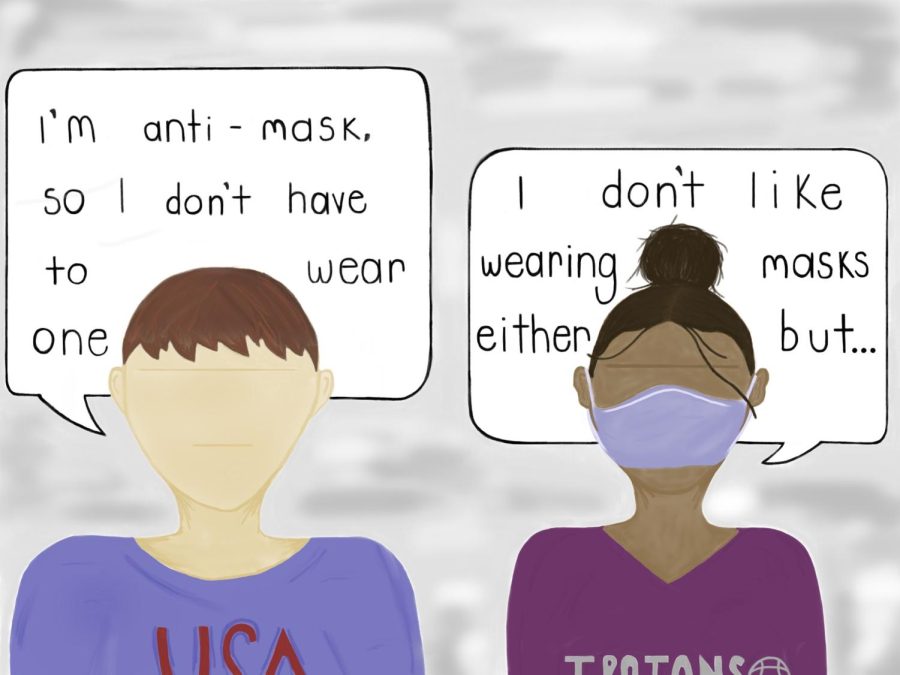‘Anti,’ ‘pro’ are words that create division
March 2, 2022
Anti-mask. Pro-life. Anti-guns. Pro-choice. Anti-vax. For anyone at least passively engaged in today’s political crossfire, these words immediately speak of controversy, politics and relentless debate. They are absolutes, statements grounded in certainty and decisiveness. But should they be? To me, at least, the answer is no.
Ever since masking was first recommended by the CDC as a COVID-19 mitigation tactic, I wore a mask everyday. Just because I wear a mask with minimal complaint when instructed to do so, doesn’t mean I’m “pro-mask.” I don’t enjoy wearing masks; in fact, I strongly dislike them, an opinion I share with many others. However, political polarization of the term “anti-mask,” despite it being technically applicable to most, has morphed the phrase into something with a different connotation entirely.
Masks are disliked throughout the United States, so why do some claim the term anti-mask as their own and use it to disregard public safety and the well being of others? Claiming to be against masks, or “anti-mask,” is nothing more than an attempt to conceal selfishness as a political agenda. This same pattern can be traced across various societal issues.
An article by Academic Influence lists abortion as the fifth most controversial topic in America. The article, like many others, explains the two sides of the issue, pro-life/anti-abortion and pro-choice. In this case, the use of “pro” and “anti” creates absolutism by implicating that the two stances are completely separate and contradictory, effectively pushing both terms to opposite sides of the political spectrum and increasing the party line divide.
Instead, we should dedicate energy towards establishing common ground; for one, the pro-life argument, in its name, does have potential merit; saving lives is a good thing, so in that regard, aren’t we all pro-life? Of course, the term pro-life, technically, is not only applicable to unborn children, but also to struggling mothers, teens and families. On the other hand, with around one in four pregnancies ending in abortion worldwide, I’d like to believe that pro-choice advocates agree that abortion shouldn’t happen as often as it does.
Reliable facts and the abandonment of divisive terms allow understanding to increase, which would slowly and effectively close the space between either side of the debate. The solution, for abortion at least, is theoretically simple; prevent the need for abortions in the first place through equal sex education, accessibility to birth control and contraceptives, and decreasing rates of rape and incest.
Anti-gun rights versus pro-gun rights are two other terms that transform the movement into a political battlefield by spreading misinformation on either side of the spectrum. The National Rifle Association is a perfect example. While many assume all gun-owners share beliefs held by the NRA, the National Rifle Association is an interest group actually comprised of a vocal minority. According to a PEW Research Center finding, only 19% of American gun owners are members of the NRA.
Like how those who are pro-gun don’t automatically support a completely unregulated gun market, those who are anti-gun are capable of understanding the second amendment and its implications. In this case, “pro” and “anti” transform a nuanced, complex constitutional debate into nothing more than a black and white issue. To move forward, society must learn to accept a solution somewhere in-between.
Overall, every argument has multiple sides and can naturally cause division between individuals and groups of people. These arguments are often heightened when politicians adopt the aforementioned phrases as their own. However, every argument also has a middle-ground, something our society often forgets. The terms “pro” and “anti,” along with all other divisive labels, do nothing but heighten controversy and disagreement.


























